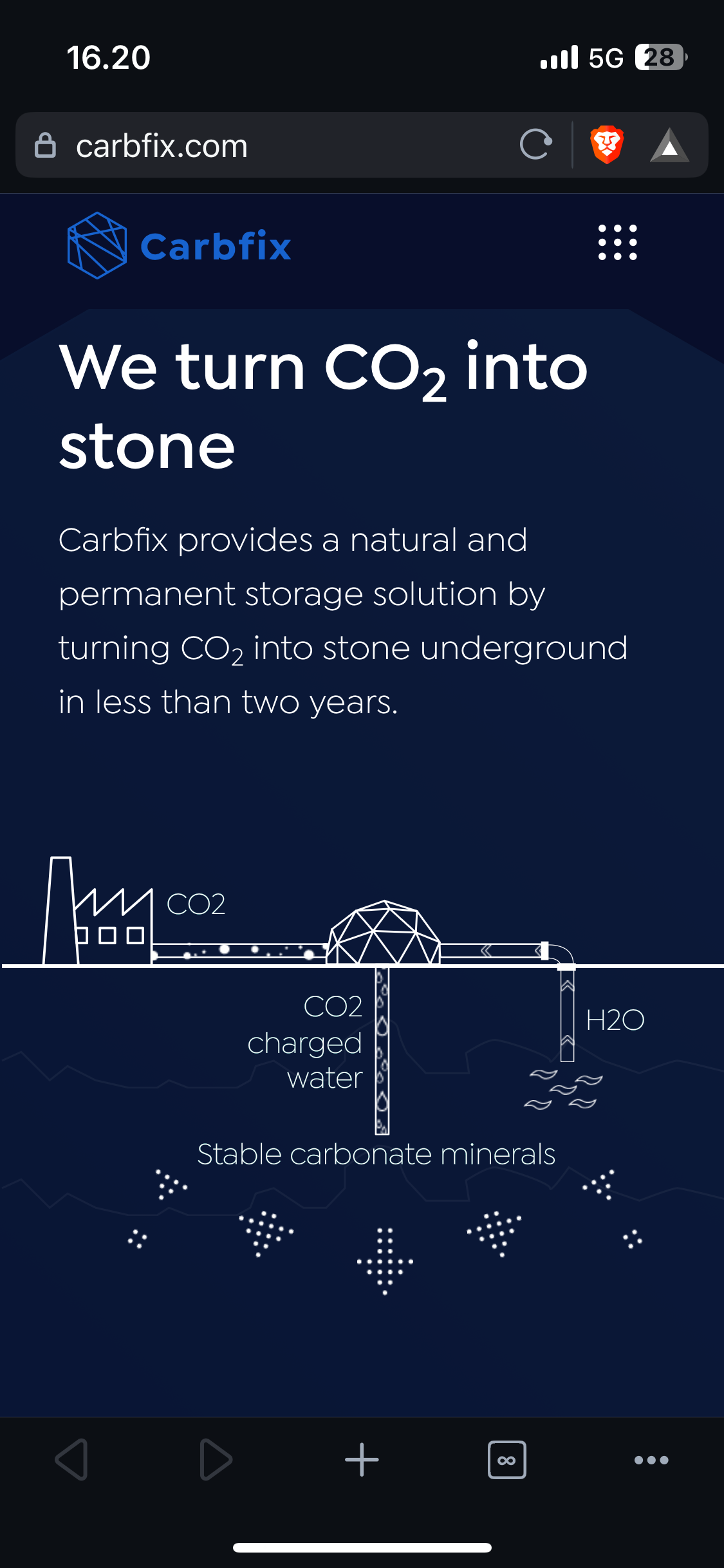Search results are dependant on who is searching. But still:
When you use DuckDuckGo the first result is wikipedia.
When you use Google the first results are corporations.
When you use Bing the first result is a corporation, then Wikipedia.
Brave search gives an AI summary of carbon capture, an investment page, one of the corp pages, and then a breakdown on why ‘carbon capture’ is a misleading tactic.
Edit: All this to say, maybe stop using Google.
You forgot to mention the crypto spam on Brave lol
You’re confusing the browser and ths search engine, I think. I use various combinations of Firefox and Brave browsers with Qwant, Brave Search and Google Search on different machines and AFAIK, I’ve only seen the crypto stuff in the Brave browser when I initially installed it. Quickly went through settings to disable that stuff and never seen it since. Still the best Chromium browser, and good to have next to Firefox in case of compatibility issues. Privacyguides.org is clear about that.
The search engine seems decent too, I haven’t noticed a big difference between Brave Search and Qwant so far, they are both fine, and less heavily manipulated than Google
Edit: I’m an idiot I thought this was a different discussion
Anyway to your point: yeah I am talking about the browser. I’m now realizing that that was not what they originally meant. My bad!
FWIW, I disabled it in the configuration and I’ve never been bothered about it again.
Let me ask Jeeves
I haven’t seen this guy in a very long time.
deleted by creator
My first results on google are all mostly from my country, so that seems to have a big impact on it too
In order: Wikipedia
Climate Change Authority Australia
Climate council Australia
Geoscience Australia
Center for Climate and Energy Solutions
It should be blatantly obvious just from basic thermodynamics that carbon capture cannot ever possibly be cheaper than not burning the fossil fuels in the first place.
Thermodynamics tells us it takes exactly as much to put the carbon back in as you got out of it by taking it out. So best case scenario we double the price of energy (which also means increasing the price of everything by a lot due to production costs increasing with higher energy costs) and capture as much carbon as we release.
However this is the real world and in the real world processes aren’t 100% efficient. Even a hyper efficient combustion engine is only like 40% efficient in converting the stored energy into a usable form. Our carbon capture techniques suck hard at the moment, but say we improve the tech. That means in the real world we would need to increase energy costs by 4-6 times. Which probably means increasing the pricing of everything by a factor of 10.
That shows just how unsustainable our current consume heavy economy actually is. And that is assuming we have a way of capturing carbon out of the atmosphere in a way that’s both efficient and long term. And do this in time before the processes we’ve set into motion spiral out of control.
And like you say, it puts into perspective how big of a win not releasing the carbon is.
Thermodynamics tells us it takes exactly as much to put the carbon back in as you got out of it by taking it out.
Thermo says it takes at least as much energy to put the carbon back in. If the process is done in a reversible way (reversible in the thermo sense), it would take exactly as much energy. And since real-world spontaneous processes are never reversible, it will always have energy lost.
I know you said down below that energy is lost, but I’m just saying that from a physics POV, there is not a possible way that reactions can ever be done in a reversible way, so it’s not like there’s even a possible theoretical world where you could approach 100% efficiency.
By definition, you will always pay the heat tax to the second law of thermodynamics.
To be extremely pedantic, operations on physical systems can be performed and perfectly reversed without loss of energy, but you couldn’t ever extract anything anywhere along the way - not even direct evidence that it happened. Our models predict that this happens literally all the time in quantum mechanics.
Edit: fun fact: this prediction is actually central to what makes quantum computers work.
That’s a good point. I hadn’t considered that, as I’m a chemist approaching thermo from the stat mech/free energy POV. I was mostly just thinking that a process where ΔG<0 is spontaneous but if ΔG=0, the system is at equilibrium, so nothing happens.
Now that I type it out, even I know that’s not exactly accurate as equilibrium is a dynamic state with lots of things happening at the molecular/electronic scale, so I guess I should have added a qualifier of “at the macroscopic scale” to my original post.
Caveat: it’s been a few weeks since I read up on this so I’m fuzzy.
It’s also worth noting we will need carbon capture to actually keep catastrophic global warming from occurring. Even if we cut emissions to 0 by 2035 we’re blowing past 1.5C and maybe even 2 as I recall.
Doesn’t mean that we can fix the climate with CC, but we can’t fix it without.
There’s nothing thermodynamically wrong with burning methane, releasing the water, and putting the CO2 back underground. Sequestration does not require un-oxidizing the carbon.
Though if we’re going to bury harmful waste underground, nuclear power reduces the quantity of waste by a factor of a million.
There’s nothing thermodynamically wrong with burning methane, releasing the water, and putting the CO2 back underground. Sequestration does not require un-oxidizing the carbon.
Maaaaybe if the CO2 is captured at the point source of the methane burner. But if you’ve already let it disperse into the atmosphere, forget about it ever making sense to try to compensate for that huge increase in entropy by collecting and re-concentrating it.
and putting the CO2 back underground
Tick…tick…tick…
I’m not sure what you’re trying to convey here. Carbon sequestration is unarguably a way to mitigate climate change, and sequestration of CO2 is probably the most reasonable way to do so. It doesn’t need to be as a gas, as taking CO2 and exposing it to various oxides creates carbonates, which are generally very stable compounds like limestone.
The other commenter simply said carbon could be captured as CO2 and sequestered without being reduced, which is absolutely true and frankly makes much more sense from a physics/thermodynamics POV.
You guessed right - without reductions or conversion it simply becomes a ticking time bomb. Anything secure enough to capture and contain a gas reliably for millennia without maintenance will be too expensive to be practical.
Methane is a greenhouse gas more potent than CO2 that was stored underground for millennia. You would need actual data to conclude that storing CO2 is too expensive.
There are no manmade Methane stores from before the Christian era and there never have been. If you’re going to argue that methane that was produced underground millions of years ago is a valid human goal, you may as well propose the simpler method of just increasing the Earth’s orbit by a few tenths of a percent to offset the heating due to CO2. Done and done.
So best case scenario we double the price of energy (which also means increasing the price of everything by a lot
This wouldn’t be wrong, because historicaly the price for polluting the environment and cleaning up the mess afterwards has never been priced in.
No, definitely not cheaper. Also not a viable alternative to not burning.
That said, we’re probably going to need it eventually to try to undo even a small amount of the damage we’ve done
Problem is that it’s not being used to undo the damage - it’s being used to justify doing more.
Solar - even with batteries is significantly cheaper under almost any circumstances… Location, scale, photovoltaics vs thermal - it only tends to affect how much cheaper. Wind is cheaper too, but less so on average.
Funny how pulling power out of thin air is cheaper and better than digging it out of the ground, shipping it all over the place and burning it.
I do wonder if it could be beneficial for the case of excess solar/wind/etc production. Obviously, renewable infrastructure, storage capacity, and efficient transfer should be prioritized, but I can see there being a place for carbon capture, as long as it’s not to the detriment of something better.
Edit: but i do totally agree with you that using fossil fuels to power carbon capture is completely idiotic and makes no sense
I think Carbon Capture is a legitimate and respectable area of research, but it’s fuckall for any practical use today or tomorrow and it should never be treated as a replacement for emission goals or the maintenance of critical ecosystems.
Carbon capture is 100% useless until the day that we completely stop using carbon energy sources.
Even if you use solar panels, that energy would better be used directly.
It’s not useless. Carbon capture will have to become mandatory at industries that will still require fossile fuels for a little longer after electrifying everything. Think cement and steel production. This is called on-site carbon capture and prevents releasing more carbon to the atmosphere. This is already happening.
Now that stupid thing that sucks C02 gas out of the air, yes, it’s total bollocka and will never ever work efficiently. Maybe if we eventually develop cheap fusion power.
But that isn’t how technology works. We’ll need carbon capture to be at a point where we can actively remove carbon from the atmosphere at a higher rate than it enters the atmosphere as we ween off carbon fuels if we ever want to survive climate change long term.
We will almost certainly need to remove carbon already in the atmosphere. Yes, we can wish getting serious about climate change one or two decades ago would have made that unnecessary, but we’re stuck with this choice now. Short of replacing every single carbon producing device tomorrow, that’s where we’re at.
Yes we are and because of those choices back then, we are fucked. The next generations will be fucked worse with each generation. It will take centuries to clean this shit up if we actively work on it and spend over 50% of our energy budget on cleaning. If we do nothing it might never recover and be the end of us…
There is a lot of things wrong with your statement but first and foremost is that Carbon Neutral is no longer a solution for our problems. Without a way to alleviate and regulate emissions already in the atmosphere the Human Race is still on a death march if it stopped producing today, much moreso 30 years from today. In addition to that, the sale of power to consumers can just increase consumption, and the infrastructure to move power and store power where it is needed is not necessarily there so for example Iceland’s Geothermal powered Carbfix may not be efficient on paper compared to magically selling the power off to a far off place: it is still an optimal nearly lossless solution given their circumstances.
No, my statement is perfect correct.
Starting carbon capture while there is still fossil fuel power generation is stupid at best. If you do it for research, sure, go nuts. Anything beyond is just making shit worse.
If you have the energy and no where to get it to, that might be the one exception, perhaps but that’s it.
If you do carbon capture with energy from CO2 power then you’re literally making it worse trying to make it better. If you use non CO2 power you’re still doing it wrong because of losses, that power would be better used to avoid others using CO2, you’d be more energy efficient that way.
My point is that there are multiple companies currently doing carbon capture and its just stupid, its another one of those “look at me being smart! Pay me money!” schemes that want government money that would be better spent on replacing CO2 power sources instead.
The “one exception” just described the vast majority of the operations. There is no using the power to avoid using CO2 because that’s not how the power market works at all. If prices go down, consumption goes up. If you think some Carbon Capture facilities are a net zero effect aside from collecting data then that’s fine, if you think they’re a dumb thing to be spending resources on then that is fine, but you’re absolutely not correct to say it’s more efficient to put all that energy into a giant capitalist grid.
I’m not saying that at all, I’m saying that it’s literally throwing a bucket of water on the floor and then mopping it up. Better not throw the bucket on the floor to begin with
Okay well the reality is people have been throwing water on the floor for 20 years and you don’t want us to clean it up.
No.
People have been throwing water on the floor for 200 years now, since the start of the industrial revolution, and right now a huge hose is connected to an enormous water tap and that hose dumps all the water straight on the floor.
You want to take a mop on that, I say that the mop is make ng it worse, because I need you to help me get rid of that hose.
Once the hose is gone, please by all means, mop away, we will need it, I fully agree. But while that hose is dumping water, I need you ) that is, the entire world) to first focus on stopping the water flow.
Edit: and just so you understand the severity of the situation: even if we spend 5-70% of the worlds energy budget on mopping 24/7, we’ll likely be mopping for the next CENTURIES to get rid of all the extra CO2 we dumped for the past 200 years.
Carbon capture, Carbon footprint, Carbon offsetting…
All things invented by oil and gas corporations to greenwash themselves in the public eye while they destroy the planet.
Good old offsetting.
Where it’s OK to cheat on your wife, as long as you slip 5 quid to a guy in another country, and he’ll tell you he’s stayed celibate.
That metaphor doesn’t apply. CO2 in the atmosphere is fungible. Taking a gram out after putting a gram in works out to zero.
Where it’s a problem is that they aren’t actually taking a gram out. Regulatory oversight is little to nothing. That has allowed companies to pay a token amount into offset programs and pretend the problem is solved. What they’re paying is far too cheap to accomplish what they claim.
Is there money in that? Because I could make some bank.
Burns, burns, burns, the lake fire…
…cuz the ring lit the lake and it was full of oil.
Cuyahoga River – “at least 13 fires” …
If you Google anything the first results are sponsored links.
…and that should tell you all you need to know.
Just looking for ways they can charge us to clean up the mess they created.
Reclamation bonding has entered the chat
Carbon Capture and Storage has proven highly effective at injecting taxpayer dollars straight into politicians’ pockets
That’s a half truth.
A lot of money was funneled directly into corporate profits and the pockets of carbon sequestration speculators.
I’m not sure that we should write it off completely…
There’s a thing in Iceland that binds CO2 underground.
It’s pretty cool: https://www.carbfix.com/
Here’s the science behind it https://www.carbfix.com/scientific-papers

Hey, I think the tech has some promise, but my opinion is this: basing our goals and pledges to solve the climate crisis on technology that hasn’t yet proven itself is putting the cart before the horse.
We need to set the objective to stop the increase of emissions, and then we can also try out sucking carbon emissions out as we do that to help accelerate our fix to the climate problem.
Whether the tech works or not, fossil fuel companies as I see it, are just using it as a delay tactic to the world reducing its dependence on their business: by making the central issue something that will help, but not ultimately solve the problem.
Agree.
The tech is in its kidsshoes, all this pushing for new technologies is almost like a hidden excuse for.continouing their fossil bullshit.
yeah, that’s legit, not the coal power plant nonsense. at this point I’d consider carbfix et al. to be at the R&D stage.
It would be better if they put that money into renewable energy.
Why not both? Reduce on all fronts.
Because carbon capture will never reduce carbon as much as competing with non-renewable energy companies
It seems we don’t have matching initial assumptions, I apologize I should have been clearer.
When I think carbon capture I mean reducing the amount of currently existing CO2 in the atmosphere, not offloading new CO2 that is being generated.
This means then that at the same time we could produce less CO2 trough renewable energy sources.
But using renewable energy will reduce the amount of CO2 in the atmosphere more than carbon capture, just not directly.
Geologist here. I work in Oil and Gas, but not for producers. Service side. We’ve helped with the geology of a handful of carbon capture injection wells this year. They get funded by the majors, but operated by someone else, and they drill them on site of a factory or plant that produces a lot of carbon. That way there is a local site to inject the carbon they capture as a by product od the industrial activity. Pretty cool stuff I’d you look past a quick internet search and make assumptions.
Out of curiosity, how long can we inject captured carbon underground for? Do we have a good estimation of the long-term ramifications?
Long term ramifications… If you store carbon for millions of years underground, eventually a future species will tap it as a fuel source.
Probably not. It’s likely carbon that is pretty much completely oxidized since OP said it was captured as a byproduct of industrial activity (after all, why would you sequester carbon that still had useful energy?) If you store fully oxidized carbon underground for millions of years, it will still be fully oxidized when it’s dug up because that carbon’s most stable state (especially in an oxygen-rich environment like Earth). The only reason fossil fuels exist is because the carbon was sequestered in a mostly reduced (aka energy-rich aka unstable) state, so you get a mess of goopy hydrocarbons after millions of years. If you try the same thing with CO2, you just get limestone.
As much as I agree with the implication that O&G companies latch on to every potential carbon sink as a way to greenwash themselves, carbon capture does have merits.
However, the only ones who can currently utilize carbon capture on a significant scale are the ones who produce a lot of carbon to begin with. Technology will have to advance drastically for it to be a carbon sink effective enough to offset emission to the point where emission cuts can be scaled down.
Source: Last year I was involved in surveyon an area that was planned for huge-scale carbon storage after capture.
One industry that is really suited for CC is steel production. Making steel from iron is basically removing the carbon from the iron ore, and that has been done since the 1800s by introducing oxygen to the molten iron. This creates a pillar of carbon dioxide from a very localized point and should, if the technology existed and was used, be easy to capture. The Swedish steel manufacturer SSAB accounts for 11% of the national Swedish emissions, and 10% of Finland’s. It’s not negligible. And steel is used every day, everywhere, and for everything. Every other metal pales in comparison. It’s a gigantic industry. And it’s perfect for carbon capture.
Hey, look at us, we are planting 2 bn trees that are ALL THE SAME.
None of the methods they present as solutions are even close to being viable. The ones that do look promising, however, are where they bind the CO2 to tailings.
Any capturing strategy is useless at scale. We need strategies to transform co2. Trees are more effective and scalable long term solutions than any carbon capture. And much cheaper
The problem is stuff like concrete… the way to make new concrete emits a shitload of CO2, whether or not you use electricity or fossil fuels. So we either need to find an alternative to cement or we need to capture all that CO2.
Plus, it’s not like carbon capture would be used in a vaccuum. It would be to supplement all other strategies
It is useless to capture it. It will diffuse back to the atmosphere at some point in the future. It must be transformed. Or we should stop producing it
Except we have clear evidence that if it’s stored properly it will stay there for millions of years. The fossil fuels (mostly) did not emit carbon into the atmosphere in the millions of years between dinosaurs / algae and now.
Sorry, but I don’t understand your point. You are made primarily of C, and you don’t emit C either, other than C that you get from food and you transform in CO2, luckily for you. Your C is safely stored in a variety of forms that do not contribute to greenhouse effect, until transformed by bacteria. C, fossil fuels and CO2 are very different things
That’s the point, we are stores of carbon until the bacteria eats us. Trees are only a store of carbon until there’s a massive wildfire.
Underground geological formations have been proven stores for carbon for millions of years, far more permanent than trees or people.
As for the difference between carbon, hydrocarbons, and carbon dioxide, they’re all really the same when it comes to the CO2 emitted, so that’s where I was going with that. You are of course correct that people and fossil fuels are not yet carbon dioxide.
In your picture you are missing the part where CO2 is the fundamental compound to create life on earth, as it is the source of carbon to “create” all living beings, as well as fuel and oxygen source needed for many of them to live.
Carbon capture is extremely expensive and inefficient, because it is thermodynamically disfavored. In the big picture ineffective, because we need to transform CO2, we don’t need to bury it. The solution is to reduce the amount of excess of CO2 released, and increase the processes that transform CO2
Cheaper and scalable, yes, but what I’m getting at is the monoculture approach that most proponents take.
Also, it requires quite a bit of land mass to do, whereas with other options, you could potentially get similar benefits on smaller footprints.
I don’t know enough about C offset dynamics to speak intelligently, but these are some of the things we need to consider.
I know enough of “C offset” to tell you that the problem is not C offset. You cannot and don’t want to “offset” carbon. Carbon is literally the most important element for nature. Carbon is not a problem at all. Excess of CO2 is the problem. By excess I mean all CO2 that the system “earth” cannot transform in biological compounds. Transformation is primary done by plants, algae and bacteria. Unless we find a ecological, economically viable way to perform artificial transformation, the only solution is to increase number of natural “transformers” and decrease excess of CO2. Any other solution is thermodynamically useless, i.e. marketing. Carbon offset as a concept is pure marketing
Not trying to challenge you in this comment: I legit want to know more.
I’m I’m agreement on the need for transformation of C. I also agree that this is more than likely going to have to come from natural sources.
Why won’t geological sequestration (e.g., chemically bonding it to rock, concrete, or Tailings) work? The thing I like about this method is that its super long term transformation (basically removal) as long as pH is controlled.
What methods look promising? I saw some biocell things that looked cool but way too niche to be practical.
Cutting emissions is definitely a key part of all this, but there’s a lag phase before the warming if the emissions we emit now are realized. On top of this, there is woefully limited regulations around methane and n2o in key sectors.
We don’t need transformation of C, we need transformation of just CO2 in other C based compounds.
The reason why capture doesn’t really work, is because you need to spend a lot of energy to break CO bonds. Therefore any solution is based on very weak chemical bonds. It means that CO2 desorbes over time, substituted by other gases. And adsorption needs to break an equilibrium, against “natural direction of processes”, i.e. requires energy.
Unless we find an efficient version of artificial photosynthesis, everything else is a waste of resources
We don’t need transformation of C, we need transformation of just CO2 in other C based compounds.
I think I’m being too general in my wording, and you’re getting hung up - an issue with typing on mobile is that I abbreviate everything. I mean CO2 sequestration/transformation.
The reason why capture doesn’t really work, is because you need to spend a lot of energy to break CO bonds. Therefore any solution is based on very weak chemical bonds. It means that CO2 desorbes over time, substituted by other gases
Yet we see this in the biological sphere, where CO2 is taken into the plants, the plants die, get broken down, some of the CO2 they transformed into biomass is decomposed, and released as CO2 by the microbial community. Some of it (climate permitting) is transformed into soil organic carbon, which has multiple fractions. Some are short-lived, and readily broken down by the microbial community (more CO2 release); some fractions (humus, or protected SOC) are much longer lived, and result in a net loss from the C system.
All of this is unsurprising, given that this is the natural system, and therefore the system ultimately balances out, due to multiple sources of inputs and outputs.
I agree about cost/energy to break CO bonds, however, the examples I’ve seen seem to indicate that it’s more stable long term.
Biochar seems interesting too, yet that requires a lot of energy input, and soil application has mixed results. You could make biochar, and then stuff it deeper into the soil or into geological formations, perhaps. Better if that biochar comes from food wastes, livestock production wastes etc. than plants.
As I said, it’s a fucking huge problem with a million facets. We’re so categorically fucked…
Yup. And they’ve been working on it for 20 years, and have yet to illustrate any scale that would effect the problem.
it’s much more nuanced than that though.
naunce? in this economy?
Okay? And how are we supposed to deal with the emissions currently in the atmosphere? Even if we abandon all technologies that generate greenhouse gases overnight, we still have shit in the atmosphere warming the planet.
The most compelling strategy I’ve heard is biochar. You immolate organic matter in a medium like nitrogen so you don’t get carbon dioxide, and then you bury the char or use it as fertilizer. The char is relatively stable so shouldn’t create much in the way of carbon dioxide once it’s formed, and because you make it in an oxygen-less atmosphere you don’t get more greenhouse gases from making it.
That’s the thing though, fossil fuel companies aren’t promoting it as harm reduction, they’re promoting it as a solution to emissions so they can keep fucking the earth for profit.
There exists a natural carbon capture cycle that will take up a lot of the existing carbon in the atmosphere. If we reduce production, it will reduce the amount of carbon capture required.
Absolutely, I also think Biochar is very promising as one way to recapture atmospheric CO2 and to compensate further emissions.
While I understood the production process to be a little different, the benefits of Biochar can’t be ignored.
- low in energy consumption
- low in recourse cost
- very good scalable
- no hidden science or process
- the stored carbon can be used as a soil amendment
The process may be a bit more complex than I understood, but my understanding is that the gist of it is to “burn” plant stuff in a way that doesn’t create carbon dioxide or other greenhouse gases. One way of doing that is to use a chamber flooded with nitrogen or similar inert gas. No oxygen means carbon can’t bind to two oxygen atoms to create carbon dioxide.
I’m confused, how can you ‘burn’ anything without oxygen? Burn literally means to oxidize
That’s why it’s in quotes. You’re subjecting it to high heat, which would normally cause it to burn, but because there’s no oxygen it chars instead.
I don’t understand. Biomass already isnt CO2. Why do we take an extra step?
Because when biomass rots, it creates CO2. By charring it you’re making the carbon more stable and less likely to become CO2 in the future. It also won’t rot when charred.
So how do we produce biomass? Plant more trees? Which we already do. Then in how many year we cut it down and biochar it instead of using it reporposing it for something else? I’m kind of failing to see the benefit. Just seems like an alternative that isn’t really any better than some of the other good alternatives.
Make algae ponds, harvest the algae, dry it, char it, bury it. Algae sucks up carbon dioxide like crazy, the downside being that it releases the carbon when it starts to rot. By charring and burying it, you’re helping to make sure that carbon doesn’t re-enter the atmosphere.
Peat, too! It’s one of the best carbon sinks we currently have.
Ah. I didn’t think of algae. Might be a good reason to harvest all the algae blooms from the fertilizer run off.
biochar is awesome
Forests, algae… There is no need for carbon capture. It doesn’t do anything on scale. There is need of transformation co2, which can be done by plants and algae
Humans burnt 100’s of millions of years of plant growth within 100 years. There is no way we can significantly reduce the CO2 in the atmosphere with plants alone in a timeframe that is necessary for humanity to see a difference. There is just not enough land to plant that many trees and plants. We need all the solutions and that includes human tech.
But it is not a solution. Carbon capture is the perfect thermodynamic example of sweeping the dirt under the rug. Best case scenario it would alleviate the problem now to make the problem worse in the mid term. Most realistic scenario it will do nothing at all.
We currently do not have a human tech to support the process. The only thermodynamically meaningful process is transformation of CO2 in safe and useful organic compounds. But all our technology is too expansive, and requires a lot of energy, production of which is currently one of the main responsible for emission of CO2
Think of biochar like humans helping plants keep the carbon out of the atmosphere. Plants are good at capturing carbon, but what happens when they die? Hell, what about all the leaves they shed? When something rots, it releases a mix of CO2 and methane (which decomposes into CO2). The idea of biochar is that it’s a way of sequestering the carbon that plants captured. For an example, you make an algae pond, harvest the algae, dry it, char it, bury it. That’s carbon that’s not going back into the atmosphere anytime soon, whereas if it was left to rot, it’d eventually wind back up in the atmosphere. You’re taking the carbon the plants captured, and processing it in a way that makes it easier to sequester.
The problem is purely thermodynamic. Plants transform co2 in useful compounds that do not contribute to greenhouse effect.
Any capture system is a temporary storage of co2 that has anyway to be transformed, because co2 is loosely trapped. Scientifically is literally sweeping dirt under the rug. There is no long term benefit (as at some point in the future you’ll have too transform more co2 than what in the atmosphere), it costs a lot, and gives a fake sense of “trying to solve the problem”, while it’s doing nothing
Who here is googling with sponsored search results?
















